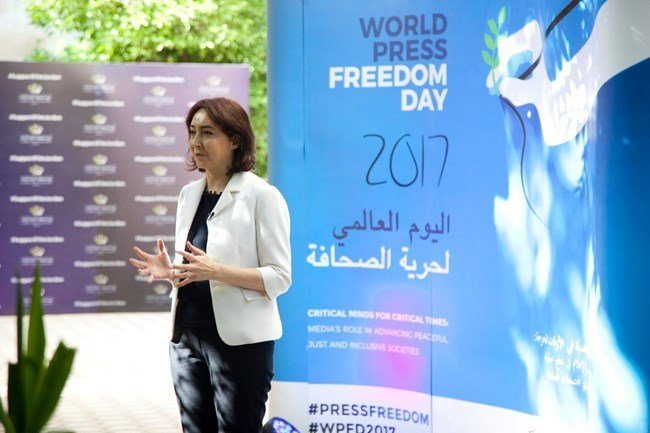Image:

13 May 2017
Amman (Jordan Media Institute) -- Her Royal Highness Princess Rym Ali, founder of the Jordan Media Institute (JMI), patronized a regional ceremony organized by the UNESCO office in Amman on World Press Freedom Day under the theme "Critical Minds for Critical Times: Media's Role in Advancing Peaceful, Just and Inclusive Societies." <br />
<br />
Costanza Farina, representative of UNESCO in Jordan, said that the World Press Freedom Day confirms the importance of free and independent press in pursuing the 2030 Agenda with steady steps. She noted that freedom of the media determines the extent of openness and transparency in society. These are two fundamental dimensions for the full exercise of the right to free expression. <br />
<br />
Mohammed Qtaishat, director of the Media Commission, underlined the role of the commission in promoting freedom of expression, in partnership with professional media, which is governed by the provisions of the Constitution and international human rights standards.<br />
<br />
Anders Pedersen, UN resident and humanitarian coordinator in Jordan, said that the World Press Freedom Day is a platform that reminds us of the decisive role played by the press and media in advancing peaceful and just societies and achieving the goals of sustainable development. <br />
<br />
Two sessions were held on the sidelines of the ceremony. In the first session on hate speech, the JMI dean said that media outlets are led to hate speech due to the degree of political extremism, the weak independence of these outlets, and the impact of social media. He urged the media to develop special sensitivity toward the infiltration of hate speech into media content by making sure that news coverage is based on hard facts and is removed from stereotyping and profiling, and that it observes fairness and balance toward all parties.<br />
<br />
Nibal Thawabteh, director of the Media Development Center at Birzeit University, attended the second session on the role of the media in building peace. She said that the results of initiatives that were launched to develop the media and promote peace have failed to meet ambitions on the ground. <br />
<br />
Dr. Alobaid Ahmed Alobaid, representative of the United Nations Office of the High Commissioner for Human Rights in Yemen, noted the role of the media in encouraging parties in conflict zones to fulfill their international commitments and spare civilians the negative effects. <br />



